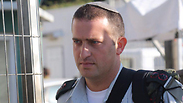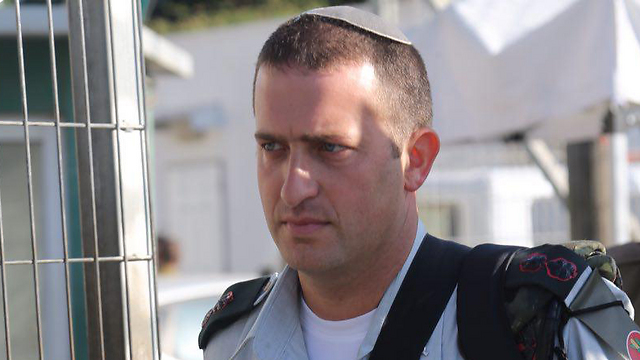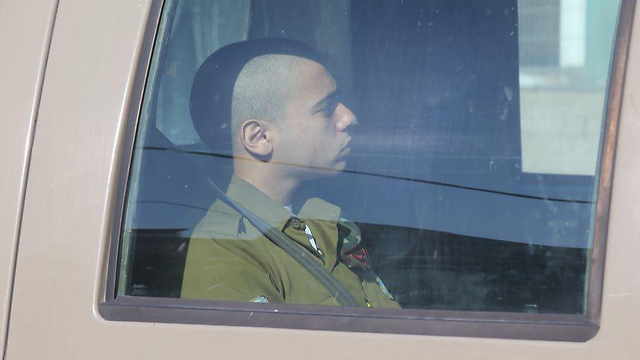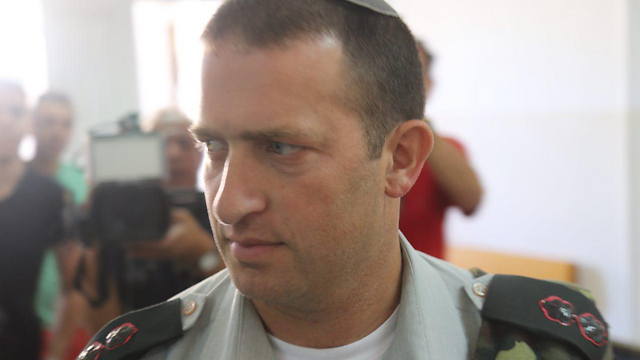
Lt. Col. David Shapira, the former commander of the Kfir Brigade's Shimshon Battalion, asserted Tuesday that Sgt. Elor Azaria, who is currently on trial for shooting dead a neutralized terrorist in Hebron, did not tell him the truth when questioned about the incident.
Shapira's testimony at court on Tuesday corresponded with the testimony he gave to the IDF's Criminal Investigation Division (CID), in which he claimed Azaria's shooting of the seriously wounded terrorist Abed al Fatah a-Sharif lacked operational justification.
Lt. Col. Shapira, who currently serves as a battalion commander at the IDF's Officers' Training School, began by describing the hardships and challenges the soldiers serving in the Hebron area face. He praised Azaria's character, saying "Elor stood out in the company and made an effort throughout his entire training. He was selected for recognition as an outstanding soldier of his company, and proved to be one of the best soldiers in the battalion. He did not have any disciplinary issues."
The battalion commander went on to say, "In the weeks preceding the incident, his father Charlie called me and said Elor was struggling with the burden of his new position, that the smile disappeared from his face. The fact that he was both a company medic and a signal operator affected him."
Turning to the incident itself, Lt. Col. Shapira said, "The first report we received was of a wounded soldier, a wounded terrorist and a dead terrorist. The Yehuda Brigade commander's orders were to evacuate the terrorists as quickly as possible, whether they're alive or dead, and this was my instructions to the company commander.
"When I got to the scene of the attack, both terrorists seemed pretty done for. The company commander briefed me on the situation. He didn't brief me about Elor's shooting at that point,” he continued. “I divided the troops on the scene so they could close it off from all directions and evacuate the terrorists. When I passed by the two terrorists, I didn't see anything that required them to be 'cleared' by a bomb disposal expert, so I instructed that they be evacuated."
"While I was giving the instructions,” Shapira elaborated, “the brigade commander approached me and said he received a report from the head of security of the Jewish settlement in Hebron about an unusual shooting at one of the terrorists and asked me to look into it. I asked the company commander if there was anything unusual in general after the neutralization of the terrorists, and he told me the incident was far graver than I thought.”
"He told me he first dealt with closing off the scene and then saw the terrorist moving. Several seconds later, before he had a chance to do anything (about the terrorist moving —ed.), he saw the terrorist's skull shatter 60 centimeters from him. He was told that Elor was the one who fired the shot. According to the company commander, Elor told him: 'He's a terrorist and he should die.'"
An hour and a half after the incident, Lt. Col. Shapira had a one-on-one conversation with Azaria. "I asked him why he shot (the terrorist) and he answered that he saw the terrorist move his head and that there was a knife close to him. I asked him, 'You were close to him, why didn't you go and kick the knife away?' Elor said 'I felt in danger.' I told him I thought he was not exactly telling me the truth, as soon after the incident, he told the company commander something completely different. I told him that because of the severity of the incident, he was suspended from serving in a combat capacity pending the conclusion of the investigation into the incident."
The battalion commander asserted that "this was an unusual incident because the shooting was not done in the initial stage of the incident, when the force was attacked, but at the point when the terrorist did not pose a threat. So this was shooting at a wounded terrorist who did not pose any danger."
Shapira rejected claims that Azaria had feared that a bomb could be detonated: "Elor didn't mention in that conversation with me he was worried about a bomb, just about a knife that was close to the terrorist. The rules of engagement differentiate between certain identification of an explosive and a suspicion of the existence of one," Shapria said. "No one informed me of a concern of an explosive belt. I didn't see anything unusual about the terrorist."
Azaria's lawyer, Eyal Besserglick, accused Shapira of "not preparing for or talking about the issue of dealing with an explosive."
"We went through the rules of engagement with the soldiers and emphasized that you open fire only in a situation in which there's a means, intention, and ability (to attack) and it is sufficiently comprehensive for a soldier to know if he's allowed to open fire in a life-threatening situation," he retorted.
Besserglick then accused Shapira of changing his testimony from his version to the CID, "you're changing it from 'we didn't talk about the issue of dealing with an explosive belt' to 'we didn't emphasize the issue.'"
Shapira maintained however, that there was no difference in his testimony. "I have no doubt that during our time in the Hebron area before the incident, Elor was present in at least one briefing about the rules of engagement. The main threats we dealt with in the briefings were stabbing and shooting. Even if there was a knife nearby, the shooting was not justified because Elor could have kicked it away. In all of my briefings to the soldiers, I talked about the exception in the rules of engagement when it came to opening fire at a wounded terrorist."
Responding to claims put forth by the defense team that Azaria was ordered to gather parts of the terrorist’s brain after the shot was fired, Shapira said, “Elor spoke to me an hour and a half after the incident when he was agitated and upset. It is normal procedure to clean the area in order to return life to the road. There is nothing wrong with this.”
Besserglick’s claimed that the company commander told Azaria an hour and a half after the incident: “I don’t need a soldier like you. You are not a soldier, you are a liar.” To this, Shapira replied, “I don’t see any problem in this. It was not a court-martial. I also know like you attorney to speak crossly. I also know how to speak in an angry tone like you, attorney. I spoke with him privately. I have no problem telling the soldier the truth to his face - that he lies and doesn’t tell the truth. Why didn’t he speak about the danger to the company commander?”
He added that, “On quite a few occasions we realize that soldiers change their version of events to their advantage because of the pressure. That is why the things that were said by Elor to the brigade commander immediately after the event (are important). I am sure that then and today there was no danger to his life.”
The defense requested during the proceedings that a video be shown of a terrorist attack in 2008 in Dimona in which a police officer, Kobi Mor shot to death a terrorist who was already neutralized but who was wearing an explosive belt. After this incident, the officer was awarded a medal by the police commissioner.
Shpira, however, rejected the parallels based on what he believed to be different circumstances. “No bomb disposal operation was conducted at this stage because nobody who was at the scene noticed a bomb. The existing orders, which also came up during the Brigade-wide evaluations of the situation in light of another event in which a wounded female terrorist was not treated, were that wounded terrorists should be evacuated from the scene without (clearance from a bomb disposal technician). I expected from Elor that if he noticed a bomb he would go to the commander standing next to him and tell im that there was a bomb and move away.”



















